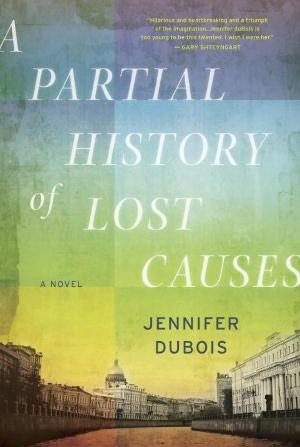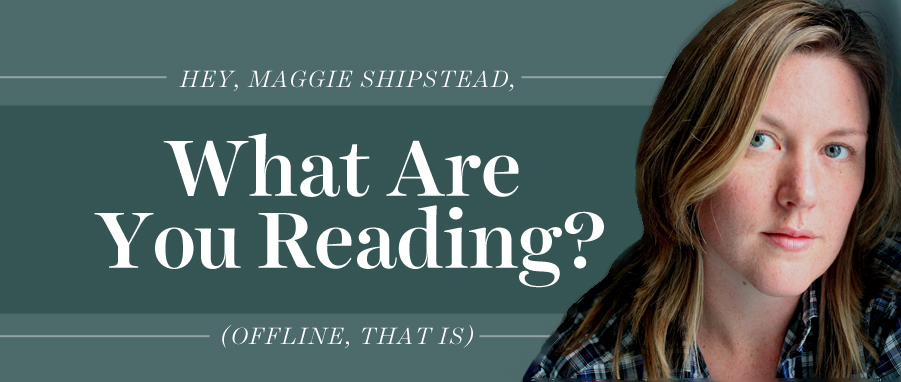Maggie Shipstead was born in 1983 in Orange County, CA. Her short fiction has appeared in Tin House, VQR, American Short Fiction, The Best American Short Stories 2010, and other publications. "La Moretta," a story published in VQR, was a 2012 National Magazine Award finalist for fiction. Maggie is a graduate of the Iowa Writers' Workshop, a former Wallace Stegner Fellow at Stanford, and a recent resident at the Cité Internationale des Arts in Paris. She doesn't really know where she lives but is open to suggestions. Seating Arrangements is her first novel. After seeing it on every list of best summer reads (including this one and this one), we ran out to buy our own copies and suggest you do the same---unless you hate laughing. I tend to have a smorgasbord of books going, dog-eared and sometimes set aside for weeks or months until I’m in the mood to pick them up again. Which book to read before bed on any given day is a question I address much like I figure out what to wear: with lots of blank staring at the possibilities, maybe making a false start or two, wishing for an infinite selection, and then yielding to the necessity of making a choice. I don’t feel much enmity for e-readers, but, for me, an integral part of the pleasure of reading is the pleasure of selecting a book from bookshelves, either mine or a store’s. Last fall I spent a month in Bali, and the Ganesha Bookshop in Ubud was a treasure trove of weird paperbacks discarded by travelers from all over the place (but, okay, mostly from Australia). I love the associations that grow between books and the places I read them. A certain mystery with a cracked cover and pill-y, yellowing paper is inseparable from a corner of shade in my landlady’s pool, where I stood in the water for hours, trying not to fry in the tropical sun. In January, when I was doing an artist residency in Paris, a Left Bank bookseller handed me The Hare With Amber Eyes, a haunting family history by ceramicist Edmund de Waal that’s about Paris and Vienna and Tokyo and war and precious objects. I read it on a hard single bed in my Spartan artist studio while the city and its past slept outside in the cold. Perfection.
These days, my bed in San Diego is a much less exotic venue for reading, but here, nonetheless, are some of the books that have recently been the object of my fickle attention.
Just finished . . .
 Telegraph Avenue by Michael Chabon
Okay, so maybe this won’t actually be released until September, but a friend scored an advance copy for me back in the spring. Sweeeet! The novel follows two families living on the seam between Oakland and Berkeley, one white, one black. The wives are partners in a midwife practice, and the husbands own a record store. Chaos ensues. This is a fat, meaty, absorbing book, jammed with off-kilter characters and happenings and with Chabon’s signature riffs on pop culture.
Telegraph Avenue by Michael Chabon
Okay, so maybe this won’t actually be released until September, but a friend scored an advance copy for me back in the spring. Sweeeet! The novel follows two families living on the seam between Oakland and Berkeley, one white, one black. The wives are partners in a midwife practice, and the husbands own a record store. Chaos ensues. This is a fat, meaty, absorbing book, jammed with off-kilter characters and happenings and with Chabon’s signature riffs on pop culture.
 The Honourable Schoolboy by John LeCarré
I’m a big fan of LeCarré, especially his Cold War novels. This novel falls between Tinker, Tailor, Solider, Spy (best title ever) and Smiley’s People in a trilogy about George Smiley’s pursuit of his KGB nemesis Karla. Just on a language level, LeCarré is an amazing stylist—a very, very, very fine writer who is extremely nimble within the omniscient point of view—but he’s also a master at assembling complex plots and setting them spinning in a perfectly rendered, dreary-yet-fascinating, invisible spy world.
The Honourable Schoolboy by John LeCarré
I’m a big fan of LeCarré, especially his Cold War novels. This novel falls between Tinker, Tailor, Solider, Spy (best title ever) and Smiley’s People in a trilogy about George Smiley’s pursuit of his KGB nemesis Karla. Just on a language level, LeCarré is an amazing stylist—a very, very, very fine writer who is extremely nimble within the omniscient point of view—but he’s also a master at assembling complex plots and setting them spinning in a perfectly rendered, dreary-yet-fascinating, invisible spy world.
In the middle of . . .
 Look At Me by Jennifer Egan
I’ve been meaning to buy this novel forever, and finally it appeared in front of my face at the right moment at the right bookstore (Books Inc. in San Francsico). One of the many things I admire about Egan’s writing is that she’s always experimenting with form and daringly fills her books with unexpected twists. In Look At Me, a model comes out of a car crash with eighty screws in her face, not disfigured but undeniably altered, and must figure out how her place in the world has also changed. That would be story enough, but other characters take turns behind the narrative wheel as well: a high school golden boy turned unhinged history professor, an outwardly plain teenage girl with a reckless streak, and a private eye, to name a few.
Look At Me by Jennifer Egan
I’ve been meaning to buy this novel forever, and finally it appeared in front of my face at the right moment at the right bookstore (Books Inc. in San Francsico). One of the many things I admire about Egan’s writing is that she’s always experimenting with form and daringly fills her books with unexpected twists. In Look At Me, a model comes out of a car crash with eighty screws in her face, not disfigured but undeniably altered, and must figure out how her place in the world has also changed. That would be story enough, but other characters take turns behind the narrative wheel as well: a high school golden boy turned unhinged history professor, an outwardly plain teenage girl with a reckless streak, and a private eye, to name a few.
 Arcadia by Lauren Groff
I will always be obsessed with a short story of Groff’s that was in the 2007 volume of The Best American Short Stories and is called “L. Debard and Aliette.” The opening is set in New York in 1918 as a flu epidemic erupts and an Olympic champion teaches a girl recovering from polio to swim and, eventually, to do sexier things. The story is retelling of Eloise and Abelard and has a mesmerizing dreaminess to it that I’m also loving in Arcadia, which begins in a hippie commune in the 70s and, the reviews tell me, progresses all the way into the future. Groff’s writing has a matter-of-fact lyricism that allows her to write about very strange things very naturally and with apparent effortlessness.
Arcadia by Lauren Groff
I will always be obsessed with a short story of Groff’s that was in the 2007 volume of The Best American Short Stories and is called “L. Debard and Aliette.” The opening is set in New York in 1918 as a flu epidemic erupts and an Olympic champion teaches a girl recovering from polio to swim and, eventually, to do sexier things. The story is retelling of Eloise and Abelard and has a mesmerizing dreaminess to it that I’m also loving in Arcadia, which begins in a hippie commune in the 70s and, the reviews tell me, progresses all the way into the future. Groff’s writing has a matter-of-fact lyricism that allows her to write about very strange things very naturally and with apparent effortlessness.
Can’t wait to start . . .
 The Cat’s Table by Michael Ondaatje
I love ships and the ocean and Michael Ondaatje’s books, so I see no reason why I won’t love this book. It’s about an eleven-year-old boy traveling from Sri Lanka to England on an ocean liner, and I think it’s going to be beautiful.
The Cat’s Table by Michael Ondaatje
I love ships and the ocean and Michael Ondaatje’s books, so I see no reason why I won’t love this book. It’s about an eleven-year-old boy traveling from Sri Lanka to England on an ocean liner, and I think it’s going to be beautiful.

